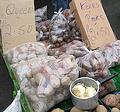 位於挪威的「斯瓦爾巴德島全球種子庫」(Svalbard Global Seed Vault)近日成立滿周年,為數大約4噸重的數百種農作物種子於2月26日紛紛運至島上。該種子庫位於挪威北部,主要是預防未來農作物可能絕種或受損時,還有備份種子儲藏起來,另外就是有如諾亞方舟一般在全球大災難來臨時至少來留有農作物的種子。
位於挪威的「斯瓦爾巴德島全球種子庫」(Svalbard Global Seed Vault)近日成立滿周年,為數大約4噸重的數百種農作物種子於2月26日紛紛運至島上。該種子庫位於挪威北部,主要是預防未來農作物可能絕種或受損時,還有備份種子儲藏起來,另外就是有如諾亞方舟一般在全球大災難來臨時至少來留有農作物的種子。
運至島內的種子來分別來自於加拿大、愛爾蘭、瑞士及美國的農作物收集中心,以及敘利亞、墨西哥和哥倫比亞聯合成立的國際農業研究中心。
種子庫坐落的地點鄰近挪威斯瓦爾巴德島的朗伊爾城(Longyearbyen),而在成立這一年當中已收集了超過40萬不同品種的種子,為數約有2億顆左右。
「看到如此多國家積極迅速地提供各國的農作物到種子庫儲存,讓我非常引以為傲。」挪威農業部長布萊克(Lars Peder Brekk)表示,「這樣的現象顯示現今社會存在著一種足以超越政治的力量,在這多元化社會中為了目標激起一股強大的團結力量。」
「我們世界如今面臨了空前的考驗,每塊土地上的生存品質都受到威脅。而我所說的大考驗也就是氣候變遷。」布萊克說道,「當科學家持續關注著氣候變遷、天氣型態轉變、溫度升高及冰帽融化等潛在問題時,位於斯瓦爾巴德島的我們則是相當關切未來幾十年農作物多樣性的運作,好幫助農作物將能適應這些變遷。」
 與挪威政府和北歐基因資源中心(Nordic Genetic Resource Center)共同營運種子庫的「全球農作物多樣性信託組織」執行長峰樂博士(Cary Fowler)表示,「種子庫於2008年成立,是為了確保未來某天可能因為自然或人為因素讓農作物遭受威脅時,人類所有現存的各種穀物將能安全地保存下來。」
與挪威政府和北歐基因資源中心(Nordic Genetic Resource Center)共同營運種子庫的「全球農作物多樣性信託組織」執行長峰樂博士(Cary Fowler)表示,「種子庫於2008年成立,是為了確保未來某天可能因為自然或人為因素讓農作物遭受威脅時,人類所有現存的各種穀物將能安全地保存下來。」
為了紀念種子庫滿周年,專門研究全球暖化領域與糧食生產的專家聚集在朗伊爾城,一起討論氣候變遷對糧食生產可能引起的重大威脅,並衡量農作物多樣性的問題以避免危機發生。
《冰凍山丘中的冷凍種子:供應給日益暖化的世界》研討會的主講者中有幾位是一篇刊載於一月份《科學人》雜誌的研究報告作者,他們在報告中警示,平均溫度在這世紀末以前極有可能隨著各地區季節的更替,飆升到比過去100年內的最高紀錄還要高。
任教於華盛頓大學並且身為研究報告作者之一的巴提斯帝(David Battisti)說道,「這就表示農作物多樣性對於糧食供給的重要性,絕非遙遠又不切實際,而是立即又真實的問題,而這也是促成種子庫成立的原因。」
Four tons of seeds representing hundreds of crop species were delivered today to the Svalbard Global Seed Vault as it celebrated its one-year anniversary. The vault in nothern Norway is intended to serve as a fail-safe backup should the original samples be lost or damaged or to provide a Noah's ark for agriculture in the event of a global catastrophe.
The seeds arriving today are from food crop collections maintained by Canada, Ireland, Switzerland, the United States, and three international agricultural research centers in Syria, Mexico and Colombia.
Located near the village of Longyearbyen on the Norwegian archipelago of Svalbard, the repository has in one year amassed a collection of more than 400,000 unique seed samples - some 200 million seeds.
"We are especially proud to see such a large number of countries work quickly to provide samples from their collections for safekeeping in the vault," said Norwegian Agriculture Minister Lars Peder Brekk. "It shows that there are situations in the world today capable of transcending politics and inspiring a strong unity of purpose among a diverse community of nations."
"Right now, our world faces an unprecedented challenge - a challenge that threatens the quality of life on every continent. I am talking about climate change," said Brekk. "As science tries to keep up with the looming threats of changing climates and weather patterns, increasing temperatures and melting ice caps, we here in Svalbard are well aware that the most important use of crop diversity in the coming decades will be helping agriculture adapt to these changes."
"The vault was opened last year to ensure that one day all of humanity's existing food crop varieties would be safely protected from any threat to agricultural production, natural or man made. It's amazing how far we have come toward accomplishing that goal," said Cary Fowler, executive director of the Global Crop Diversity Trust, which operates the seed vault in partnership with the Norwegian government and the Nordic Genetic Resource Center in Sweden.
To mark the anniversary of the vault, experts on global warming and its effects on food production have gathered in Longyearbyen to discuss how climate change could pose a major threat to food production, and to examine crop diversity's role in averting crisis.
Speakers at the seminar "Frozen seeds in a frozen mountain - feeding a warming world" include the authors of a study published last month in "Science" magazine warning that by the end of this century the average temperatures during growing seasons in many regions will probably be higher than the most extreme heat recorded over the last 100 years.
"This means that the vital importance of crop diversity to our food supply, which inspired the creation of the seed vault, is neither remote nor theoretical but immediate and real," said David Battisti, a climate change expert at the University of Washington and one of the lead authors of the paper.



